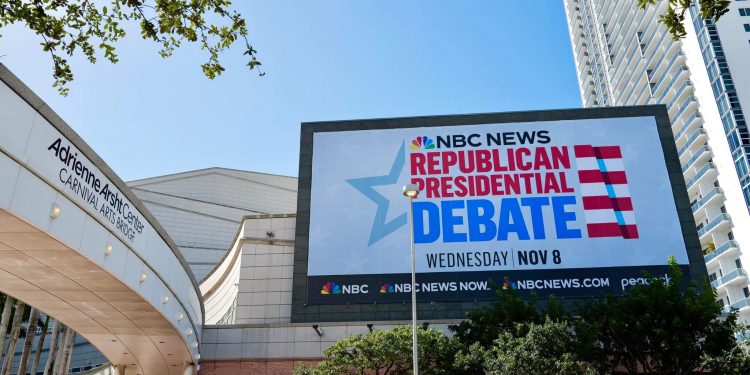Five Republican presidential candidates delivered a fiery debate in Miami, clashing over critical issues such as the war in Gaza, immigration policies, and the daunting task of securing the party’s nomination against the backdrop of former President Donald Trump’s enduring influence.
Florida Governor Ron DeSantis, former United Nations envoy Nikki Haley, former New Jersey Governor Chris Christie, entrepreneur Vivek Ramaswamy, and Senator Tim Scott took the stage in what became the third significant face-off of the campaign season.
The debate roster was notably shorter following the suspension of Mike Pence’s campaign and Doug Burgum’s failure to meet the qualifying criteria.
Despite his absence and current legal challenges, Trump maintained his position as the frontrunner, casting a long shadow over the proceedings.
Discussions on the Gaza war were at the forefront, with all candidates presenting a united front in their support for Israel, albeit with varying degrees of emphasis on military involvement and strategy.
Haley and Ramaswamy sparred, showing particularly sharp exchanges, signaling intensifying rivalries as each sought to carve out their unique stance.
Scott, previously more reserved, stepped up with a forceful performance, taking advantage of the spotlight and asserting his viewpoints more boldly.
DeSantis continued to showcase his conservative achievements in Florida, using them as a foil to criticize the Biden administration’s policies.
The candidates uniformly adopted pro-Israel positions, with DeSantis urging Israeli Prime Minister Benjamin Netanyahu to “finish the job once and for all” against Hamas, which he described as a terror group with intentions to harm not just Israelis but Jews worldwide.
Haley supported DeSantis’s view, reiterating the critical strategic role Israel plays in the broader context of combating Islamic terrorism.
Ramaswamy, while also supportive of Israel, cautioned against repeating past mistakes of military intervention, referencing the conflicts in Iraq and Afghanistan.
Notably absent from the candidates’ discourse was any mention of the Palestinians or their perspective on the conflict.
The debate took a hawkish turn when the focus shifted to Iran, with Scott suggesting a more direct approach, advocating for action against the Iranian leadership rather than its proxies. Similarly, Haley proposed forceful measures, and DeSantis warned Iran against harming American service members.
On Ukraine, a divide was evident, with Ramaswamy opposing further aid to Kyiv and drawing sharp criticism from his counterparts. The candidates expressed varying strategies to end the conflict and the necessity of European nations shouldering more responsibility.
China was a unanimous concern among the candidates, with each emphasizing the need to address the growing rivalry with Beijing, especially in terms of military strength, economic policies, and the ideological battle between authoritarianism and democracy.
Finally, the debate did not shy away from the looming presence of Trump, with candidates openly criticizing his absence from the debate, his unfulfilled campaign promises, and the potential distraction of his legal entanglements.
As the GOP race heats up, candidates are increasingly willing to confront each other and the shadow of Trump, setting the stage for a contentious primary season ahead.



























